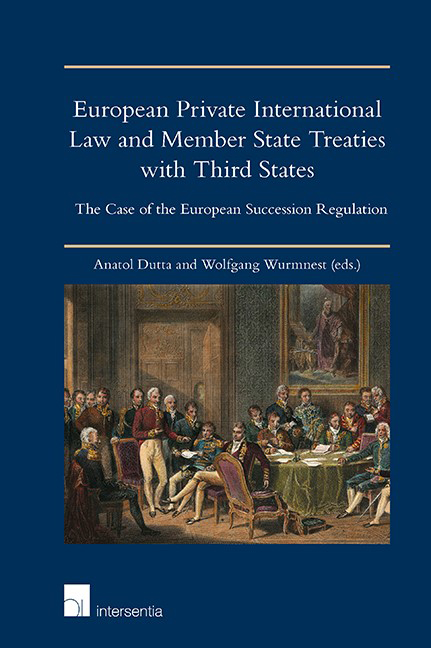 European Private International Law and Member State Treaties with Third States
European Private International Law and Member State Treaties with Third States Book contents
- Frontmatter
- Foreword
- Contents
- List of Treaties and Conventions
- List of Abbreviations
- List of Contributors
- Introduction
- Questionnaire
- PART I THE PERSPECTIVE OF EU MEMBER STATES
- PART II THE PERSPECTIVE OF THIRD STATES
- PART III THE PERSPECTIVE OF THE EUROPEAN UNION AND A COMPARATIVE OUTLOOK
- The Perspective of the European Union
- Comparative Report and Policy Perspectives
- Annex
- Index
- About the Editors
The Perspective of the European Union
from PART III - THE PERSPECTIVE OF THE EUROPEAN UNION AND A COMPARATIVE OUTLOOK
Published online by Cambridge University Press: 12 November 2019
- Frontmatter
- Foreword
- Contents
- List of Treaties and Conventions
- List of Abbreviations
- List of Contributors
- Introduction
- Questionnaire
- PART I THE PERSPECTIVE OF EU MEMBER STATES
- PART II THE PERSPECTIVE OF THIRD STATES
- PART III THE PERSPECTIVE OF THE EUROPEAN UNION AND A COMPARATIVE OUTLOOK
- The Perspective of the European Union
- Comparative Report and Policy Perspectives
- Annex
- Index
- About the Editors
Summary
THE INTERESTS OF THE EUROPEAN UNION
The country reports in this book show that the private international law treaties of the Member States with third States cannot be seen as being in the interest of the European Union (EU). These bilateral or regional conventions diminish the harmonizing effects of European private international law, especially of the common rules on jurisdiction and applicable law, as based on Article 81(2)(c) of the Treaty on the Functioning of the European Union (TFEU). Only the recognition and enforcement provisions of the European Regulations are unaffected, at least as far as the Member State's conventions are restricted to the recognition of third State decisions in the Member States or Member States‘ decisions in third States: the private international law Regulations of the EU deal with the cross-border effects of European decisions only and leave the circulation of judgments between Member States and third States to the national law of the Member States, including their treaties. Third State treaties on recognition and enforcement might even be – as Stéphanie Francq and Julie Mary have stressed in the Belgian report – in the interest of the EU, at least as far as the jurisdictional concepts of the Regulations are in fact transported to third States by reviewing the indirect jurisdiction of the third State under the European jurisdictional standards.
The fact that the treaties of the Member States limit the harmonizing effects of EU law is, as such, already not ideal. However, the interference with the harmonized choice-of-law rules in the area of the Succession Regulation is particularly damaging. Here the European legislature has introduced an instrument whose functioning is in fact dependent on European decisional harmony: the European Certificate of Succession can operate effectively only if the certified position as an heir, as a legatee having direct rights in the succession, as an executor of wills or as an administrator of the estate (cf. Article 63(1) SR) is assessed in all Member States on the basis of the same applicable law.
- Type
- Chapter
- Information
- European Private International Law and Member State Treaties with Third StatesThe Case of the European Succession Regulation, pp. 319 - 328Publisher: IntersentiaPrint publication year: 2019


